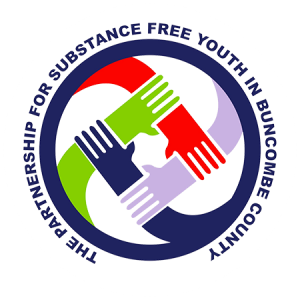Mountain Xpress Publishes Letter to the Editor from Coalition Staff on Preventing Underage Drinking
Underage access to alcohol in the home has always been an issue. In our 2019 survey of Buncombe County and Asheville City Schools, 13.3% of sixth graders and 52.6% of 11th graders reported that alcohol is easy to get. Those who use alcohol said the most common place they use it is at a friend’s house or at their own home.
This became even more of an issue during the COVID-19 pandemic. Alcohol sales for off-premise (home) consumption has significantly increased over the last two years, which means that even more alcohol is available, especially if it is not secured (locked up) and monitored. There have also been increased mental health issues due to the stress and isolation of the pandemic, which can result in more youths trying to find coping mechanisms like alcohol.
Over half of Buncombe County residents we surveyed in our 2021 Underage Drinking Survey said they feel that underage drinking is a problem here. The main reasons people feel it occurs is due to culture and expectations, access, coping, parental acceptance and enjoyment. The majority said it is occurring at home. Almost half said that parents, caregivers and other adults give alcohol to young people. Approximately 88% said drinking has increased as a result of the pandemic.
What can you do to make your home a safer space?
1. Youths often imitate behaviors that adults in their life do. If the adults they are around are using alcohol to cope with stress, they take note of this and may begin mirroring this behavior. The more you can handle your own stress in healthy ways, the more likely your children will be to handle their stress in healthy ways. Model lower-risk drinking habits. Lower-risk drinking is defined as up to one standard drink per day for women and two standard drinks per day for men. Zero drinks is the appropriate amount for anyone underage, pregnant or driving.
2. Don’t unintentionally provide alcohol to youths who live in or visit your home. How? Secure and monitor alcohol in your home. Our coalition, the Partnership for Substance Free Youth in Buncombe County, provides free materials (i.e., cabinet, closet and fridge locks and bottle cap locks) to help adults lock up alcoholic beverages to deter youth use. While you may not think your child would take alcohol without permission, locking it up removes the temptation for them, their friends or other underage relatives who may visit your home. Adults who have done this report that knowing their alcohol is off-limits offers them additional peace of mind that the youths in their home are safer.
3. Talk about the risks of underage drinking with the youths in your life and be clear about your expectations.
4. Don’t intentionally provide alcohol to anyone underage. The legal drinking age is 21 for a reason. Alcohol dependency is five times more likely for teens who start drinking before 14, compared to after they’re 21. Underage drinking isn’t just a “rite of passage” or “phase of life” that people grow out of. Nearly 97% of heavy adult drinkers started before the age of 21. Alcohol can have serious negative impacts on the health of young people, impairing learning and memory. Alcohol is linked to increases in unintentional injuries such as car crashes, falls, drowning, burns and firearm injuries. It has been proven that alcohol increases the risk of at least seven types of cancer.
Thank you for helping to make our community a safer place for the young people of Buncombe County. If you would like to share your perspective on underage drinking in Buncombe County, please follow us on social media for links to this year’s survey. You can also contact us for a free cabinet or bottle lock. Reach us via Facebook at The Partnership for Substance Free Youth in Buncombe County; Instagram at ABFuturesMovement and email at substancefreeyouthbc@gmail.com
— Miranda Poe and Montana Montiel, prevention specialists, and Matilene Osho, project coordinator
RHA Health Services and the Partnership for a Substance Free Youth in Buncombe County
Asheville
